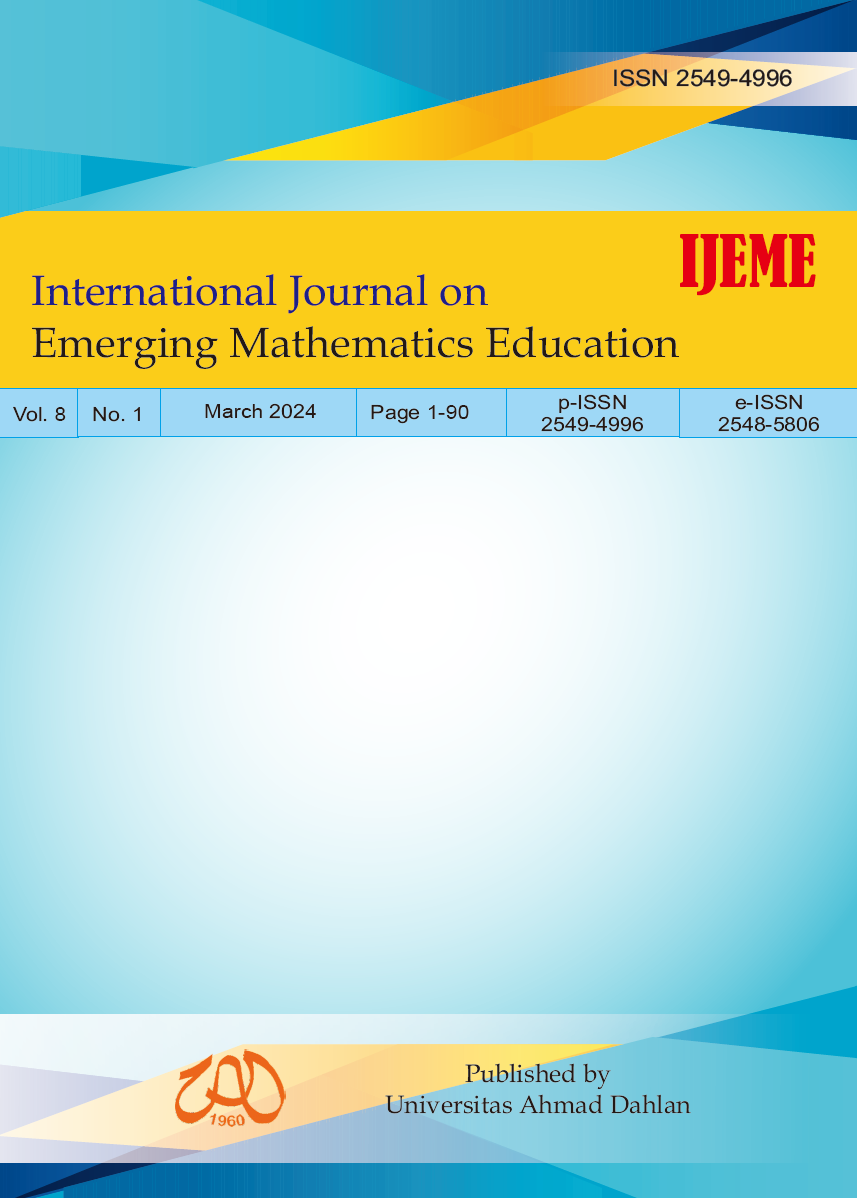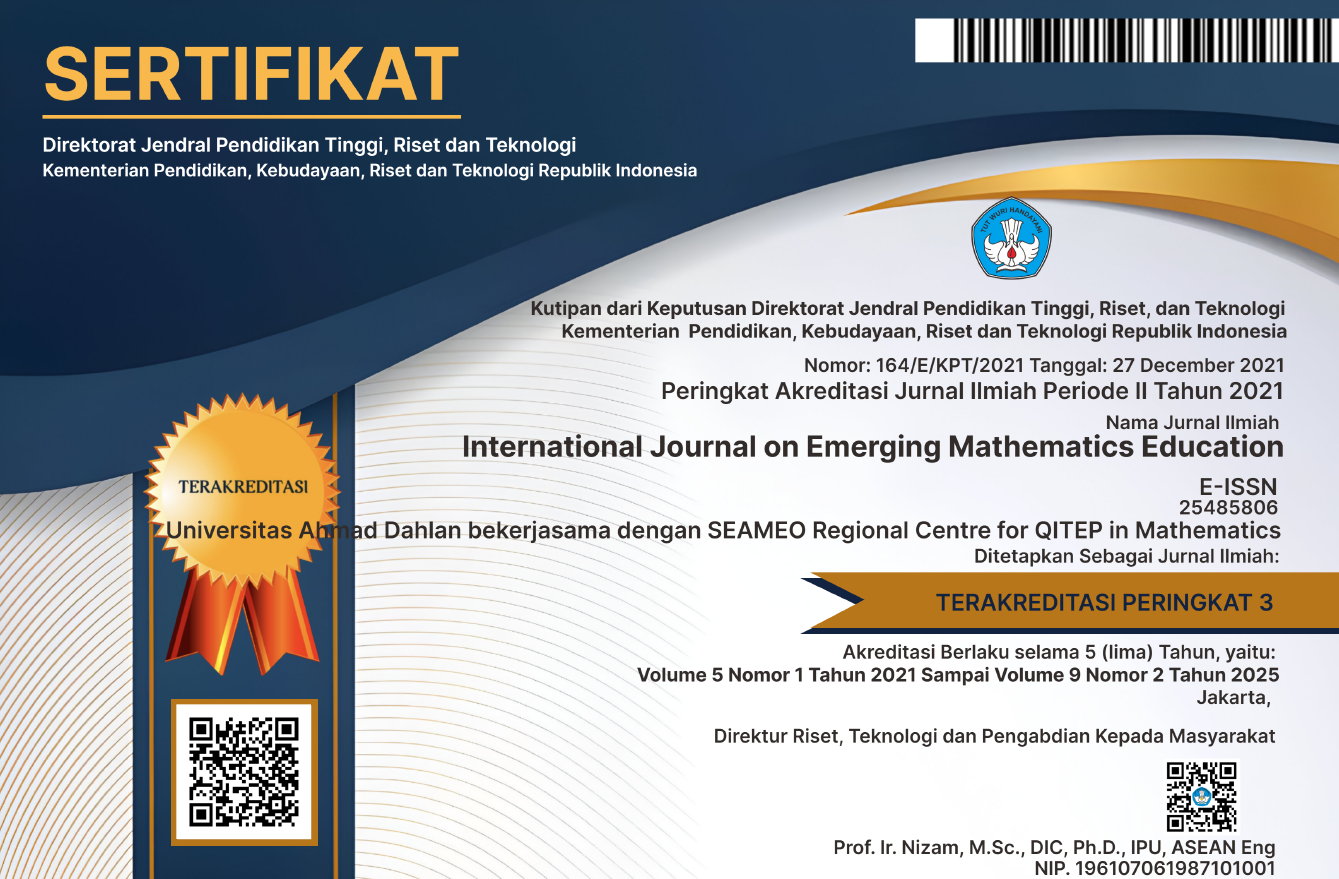Development of Problem-Based Learning E-Module in Junior High Schools 15 Yogyakarta
DOI:
https://doi.org/10.12928/ijeme.v8i1.29586Keywords:
E-Module, Problem-Based Learning, Mathematical Literacy SkillsAbstract
Algebra is a concept that is abundant in everyday life, connecting symbols with contextual problems. The challenge of learning algebraic forms is apparent among seventh-grade students at SMP N 15 Yogyakarta, who have a low mathematical literacy. The initial research findings show variability in the components of mathematical literacy among students, including Communication (23%), Mathematicalization (20%), formulation of Problem-Solving Strategies (11%), Reasoning and Argumentation (12%), Symbolic, Formal, and Technical Language Usage, and Operations (2%), Representation (18%), and use of Mathematical Tools (18%). One of the reasons for the low literacy is the learning model and the material is less suitable. This research aims to develop a PBL-based e-Module to improve students' mathematical literacy in algebraic forms. The research method used is R&D with the ADDIE model (Analyze, Design, Development, Implementation, Evaluation). The research instruments include expert validation of materials and media, student responses, and pretests. The developed e-Module received good validation from media experts (average 4.33) and material experts (average 4.63). Student responses were also positive, averaging 82% falling into the practical category. The conclusion is that this e-Module is suitable for use as a tool for improving students' mathematical literacy.References
Amalia, E., Surya, E., & Syahputra, E. (2017). The effectiveness of using problem based learning (PBL) in mathematics problem solving ability for Junior High School students. International Journal of Advance Research and Innovative Ideas in Education, 3(2), 3402-3406.
Istiandaru, A., Istihapsari, V., Wardono, W., & Mulyono, M. (2015). Problem Based Learning (PBL) Dengan Pendekatan Realistik-Saintifik dan Asesmen Pisa Untuk Meningkatkan Kemampuan Literasi Matematika. Edumatica: Jurnal Pendidikan Matematika, 5(01).
Kholifasari, R., Utami, C., & Mariyam, M. (2020). Analisis kemampuan literasi matematis siswa ditinjau dari karakter kemandirian belajar materi aljabar. Jurnal Derivat: Jurnal Matematika Dan Pendidikan Matematika, 7(2), 117-125.
Kurniawan, D. A., & Piyana, S. O. (2019). E-Modul etnokontruktivisme: implementasi pada Kelas V Sekolah Dasar ditinjau dari persepsi, minat dan motivasi. JTP-Jurnal Teknologi Pendidikan, 21(2), 165-177.
Sugiyono. (2015). Metode Penelitian Kualitatif: Untuk Penelitian yang Bersifat Eksploratif, Interpretif, Interaktif & Konstruktif. Alfabeta.
Tan, O.-S. (2009). Problem Based-Learning Innovation: Using problems to Power Learning in tje 21st. Cengage Learning Asia Pte. Ltd.
Ula, I. R., & Fadila, A. (2018). Pengembangan E-Modul Berbasis Learning Content Development System Pokok Bahasan Pola Bilangan Junior High School. Desimal: Jurnal Matematika, 1(2), 201-207.
Ulum, B., & Wiyatmo, Y. (2018). Pengembangan E-Modul Berbasis Web Fliphtml5 Untuk Meningkatkan Hasil Belajar Ranah Kognitif Pada Topik Momentum Dan Impluls Kelas X SMA Ditinjau Dari Minat, Kemampuan Awal, Dan Respon Pembelajaran. Pendidikan Fisika, 1, 1–10.
Via, C. M. (2021). Pengembangan E-Modul Bernilai Islam Dengan Aplikasi 3D Page Flip Professional Untuk Kelas V Mi.
Wibowo, E. (2018). Pengembangan Bahan Ajar E-Modul Dengan Menggunakan Aplikasi Kvisoft Flipbook Maker. Doctoral dissertation, UIN Raden Intan Lampung.
Wibowo, E., & Pratiwi, D. D. (2018). Pengembangan bahan ajar menggunakan aplikasi kvisoft flipbook maker materi himpunan. Desimal: Jurnal Matematika, 1(2), 147-156.
Widoyoko, E. P. (2018). Evaluasi pembelajaran Panduan Praktis Bagi Pendidik dan Calon Pendidik. Pustaka Pelajar.
Winkel, W. S. (2009). Psikologi Pengajaran. Media Abadi.
Downloads
Published
How to Cite
Issue
Section
License
Copyright (c) 2024 Sheldy Derunansyah, Puguh Wahyu Prasetyo

This work is licensed under a Creative Commons Attribution-ShareAlike 4.0 International License.
License and Copyright Agreement
In submitting the manuscript to the journal, the authors certify that:
- They are authorized by their co-authors to enter into these arrangements.
- The work described has not been formally published before, except in the form of an abstract or as part of a published lecture, review, thesis, or overlay journal. Please also carefully read the International Journal on Emerging Mathematics Education (IJEME) Author Guidelines at http://journal.uad.ac.id/index.php/IJEME/about/submissions#authorGuidelines
- That it is not under consideration for publication elsewhere,
- That its publication has been approved by all the author(s) and by the responsible authorities, tacitly or explicitly, of the institutes where the work has been carried out.
- They secure the right to reproduce any material that has already been published or copyrighted elsewhere.
- They agree to the following license and copyright agreement.
Copyright
Authors who publish with the International Journal on Emerging Mathematics Education (IJEME) agree to the following terms:
- Authors retain copyright and grant the journal the right of first publication with the work simultaneously licensed under a Creative Commons Attribution License (CC BY-SA 4.0) that allows others to share the work with an acknowledgment of the work's authorship and initial publication in this journal.
- Authors are able to enter into separate, additional contractual arrangements for the non-exclusive distribution of the journal's published version of the work (e.g., post it to an institutional repository or publish it in a book), with an acknowledgment of its initial publication in this journal.
- Authors are permitted and encouraged to post their work online (e.g., in institutional repositories or on their website) prior to and during the submission process, as it can lead to productive exchanges, as well as earlier and greater citation of published work.
![]()
Ciptaan disebarluaskan di bawah Lisensi Creative Commons Atribusi-BerbagiSerupa 4.0 Internasional.





